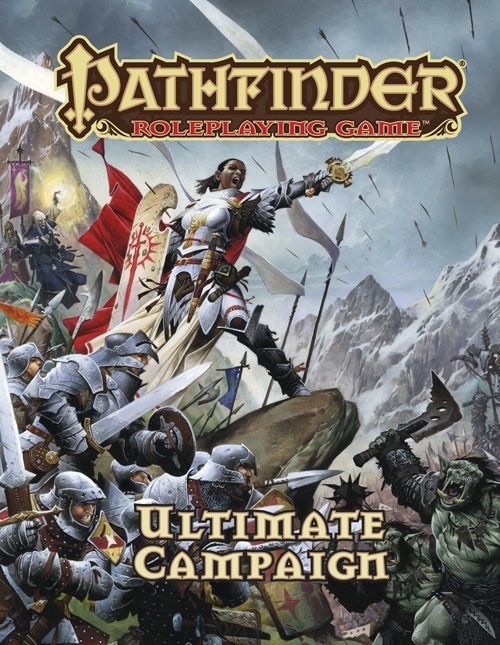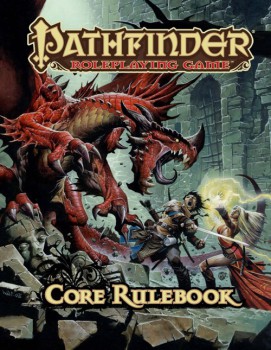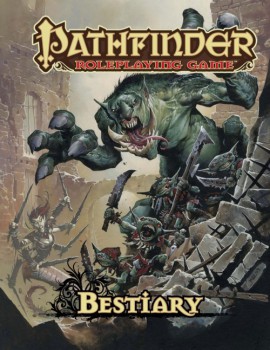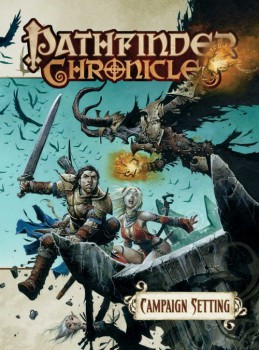Pathfinder’s Ultimate Campaign Boosts Gaming Options

I’m a big fan of rule systems. Throughout my experience in role playing, both as a player and a gamemaster, I’ve loved building interesting characters, worlds, and storylines on my own, rarely relying on established modules and setting manuals. But to me the rules are a guide for the game and I try to follow them fairly closely, using them to inspire new ideas on where to go. In a way, it’s the limitations of rule systems that provide the boundaries for the story to evolve off of.
For years running MUSHes, I grew frustrated with characters who would assume knowledge that had no basis in the statistics their characters had. Most of this time was spent on games based on White Wolf’s Storyteller system, in which I mainly focused on Mage: The Ascension, so had to deal with a disturbing number of Mages who assumed that, just by virtue of being a Mage, they knew all about the other supernatural races, like details about the various Vampire: The Masquerade clans. Not without the right Lore rating, buddy!
These days, I’ve returned to fantasy adventure gaming, running a Pathfinder campaign. Still, though, I like using the rules and statistics as my guide. If a character doesn’t have any ranks in Swim, then I roleplay him as if he’s never learned how to swim … and maybe he’s just a little scared of the water because of it. No ranks in Knowledge(nature), then he doesn’t know what poison ivy looks like and mistakes large dogs for wolves.
In fact, I go out of my way to buy ranks that I don’t feel will be particularly useful just because I feel the character needs to have them. A ranger who doesn’t have any ranks in Craft(bows), and is thus unable to craft new arrows while away from town, makes absolutely no sense to me. Even if I have every intention of buying my arrows with adventure loot, I spend the skill points to have a couple of ranks of Craft(bows), because it’s something the character would know!
This is my thinking on the character level, but rarely have I adopted many campaign-level rule systems, letting the overall campaign evolve a bit more freely. In part, this is just because I’ve never seen campaign-level systems that seemed flexible enough to do what I wanted, yet still provided useful guidance for characters. That is until I got my copy of Pathfinder‘s new Ultimate Campaign (Paizo, Amazon) supplement, which instantly got implemented into my current campaign and has enriched the options in just a single game session. Now if my players say, “I want to own a tavern” or “I want to build a kingdom,” I can tell them exactly what it will take, instead of just making something up.
Ultimate Campaign has a number of systems for various aspects of gameplay. I don’t think any GM would want to (or should) implement all of them, but depending upon your campaign setting, group dynamics, and play style, there’s something in here for pretty much every group. If it has a flaw, it may be that there’s just too much good stuff in it … so much, in fact, that it looks like they are shoving some related material into an upcoming supplement, Quests & Campaigns (Paizo, Amazon). I’ll definitely want to see what new options it presents but, for now, let’s focus on the systems in Ultimate Campaign:
Character Background:
The first chapter includes a variety of background options and traits (sort of like mini-feats) that can enhance the creation of your character. There are also randomization tables for a lot of the key features, such as numbers of siblings, formative childhood events, and so on. For players who have only a vague sense of the sort of character they’d like to play, this can be a big help to flesh out their background. It’s also great for GMs. Planning a NPC to introduce in an upcoming storyline, I had a very generic idea of what class I needed. I rolled up a couple of randomized background components and now have quite a complex character with enough of a backstory to generate some side plots and complications for months to come. (He also has two half-orc siblings, which is not something I would have planned.)
Downtime:
The second chapter focuses entirely on a coherent downtime system that can be implemented to cover activities between adventures, primarily focused on giving the players options to build organizations and businesses; but the system has benefits even for those who have no specific interest in that sort of thing. Basically, the system is built around accumulating four different types of Capital:
- Goods
- Influence
- Labor
- Magic
 Goods and Labor are cheapest, with Influence a touch more expensive, and Magic substantially more expensive. You can either buy this Capital outright, spend downtime earning it at a discounted cost, or have the GM provide it as an adventuring reward. This immediately appeals to me as a good way of adding rewards beyond raw gold, magical items, and XP, and which motivates roleplay as the players have to figure out how best to leverage the Influence that they gained when ridding the local village of their Orc problem. Should they use it to build a small tavern or shop or magical academy in town, recruiting employees and a manager to run things (and thus generate more Capital), or should they just trade it in for discounts on equipment and move on to the next adventure?
Goods and Labor are cheapest, with Influence a touch more expensive, and Magic substantially more expensive. You can either buy this Capital outright, spend downtime earning it at a discounted cost, or have the GM provide it as an adventuring reward. This immediately appeals to me as a good way of adding rewards beyond raw gold, magical items, and XP, and which motivates roleplay as the players have to figure out how best to leverage the Influence that they gained when ridding the local village of their Orc problem. Should they use it to build a small tavern or shop or magical academy in town, recruiting employees and a manager to run things (and thus generate more Capital), or should they just trade it in for discounts on equipment and move on to the next adventure?
The systems for creating buildings, businesses, and organizations are extremely clear and for those who like such things are a great optional system to incorporate, but they’re not for everyone. Those who just want to bust some heads can certainly do so.
Campaign Systems:
The third chapter contains a wealth of campaign systems:
Alignment: Descriptions of the various alignments and a system for tracking behaviors that may cause an alignment change.
Bargaining: Rules for characters who want to haggle over the price they get for their adventuring loot, crafted items, or other treasures.
Companions: New details on animal companions, eidolons, cohorts, followers, and hirelings, including ways to help incorporate them into ongoing plots in the story.
Contacts: Rules for establishing and maintaining contacts, as well introducing a system for tracking the trust and risk levels of dealing with a particular contact.
Exploration: When adventuring in a new territory, these rules can help guide your exploration efforts.
Honor: For characters and cultures that value honor, this is a nice system to track that honor and “spend” honor points in order to gain favor. Various honor codes are presented, or you could create your own. One problem with this is that it seems very culture-dependent. Still, if you have a character who values honor strongly, this provides additional motivation and roleplaying opportunities to focus on honorable behavior.
Investments: Some characters may want to make their money work for them, but not by using the downtime system to actually build a business on their own. One option for these characters is to invest in another business. I especially like this because they can be tied directly into the adventures in the game. For example, if the dragon terrorizing a local village burned down the granary, perhaps the owner will need an influx of cash in order to rebuild, providing an investment opportunity for the very adventurers who just uncovered a dragon’s hoard!
 Lineage: Rules for building a family history and incorporating it into the game, dealing with the death of family members, and so on. This is a pretty system-light section, actually, and mostly just provides some good ideas for weaving background characterization into the game.
Lineage: Rules for building a family history and incorporating it into the game, dealing with the death of family members, and so on. This is a pretty system-light section, actually, and mostly just provides some good ideas for weaving background characterization into the game.
Magic Item Creation: An expansion on the basic magic item creation rules, including cooperative crafting, upgrading existing items (changing bracers of armor +1 into bracers of armor +3, for example), recharging magical items, altering existing items, and implementing talismanic components that are needed in the crafting process.
Relationships: This gives an option for a “relationship rating” that can be tracked for friends, family, allies, rivals, and enemies. This is probably the area where I least see the need for a system, but I could see some cases where it comes in very useful. Again, though, even if you don’t adopt the system, this section has some great tips for incorporating family, spouses, and other relationships into the game.
Reputation and Fame: A system for tracking a character’s fame and reputation within the adventuring world, as well as options about how to spend the accumulated “prestige points” to gain long-term titles that give benefits in game, such as joining an organization, or short-term benefits like being able to get out of trouble with the local constabulary.
Retirement: This includes some tips for how to handle things when you’re ready to retire an adventurer and move on to a new character.
Retraining: Rules for retraining during downtime, so that you can lose skills, feats, and abilities that you don’t use as much as you expected to and replace them with ones that are more in line with your character. You can even lose levels in a class to gain levels in another class!
Taxation: The only two things in life that are certain are death and taxes. Adventurers may be able to cheat death, but … well, you get the idea. This section has rules on how to deal with taxation and taxation-related factors, like corrupt tax collectors.
Young Characters: Rules for starting characters who are younger than your typical starting adventurer, as well as the dangers of doing so.
As you can see, there’s really a plague of riches here. Each system on its own is quite good, but I think that taken together it’s just too much logistically for any campaign to probably handle well. Of course, the intention isn’t really that anyone will incorporate all of this anyway! The nice thing is that you certainly don’t have to take any systems that you don’t find useful.
For example, the Honor system just doesn’t make sense for my group, which contains a mix of mostly chaotic and neutral character alignments, and I’ve decided that the Relationship system is too formal for me as well. We have, however, adopted the Fame system and, should anyone want to use it, I would allow them to use the Investment system, and I am tracking out-of-character actions that cause shifts in alignment.
This chapter is divided into two sections – Kingdom Building and Mass Combat.
The Kingdom Building section mixes some of the earlier systems in new ways. The buildings from the Downtime section take on some new importance when viewed as part of a complete Settlement, providing various benefits to the settlement and to the kingdom as a whole. (Of course, for the PC to gain the benefits of Capital from them, they’d have to be the one who owns the building.) And the Exploration system mentioned above provides the basis for exploring new terrain and claiming it as part of your kingdom.
The Kingdom Building section provides some interesting opportunities, as you have to keep a lot more track of the mood of the people to avoid an uprising. You can put money into the treasury and later take it out (although this tends to aggravate the people, who would like their rulers to focus on keeping the coffers full). And it does take time away from adventuring in a way that not all players would find appealing.
However, even if you aren’t building a kingdom of your own, you might be working for someone who is, or become enlisted in the military as a means of helping to combat a foe that’s too powerful for you alone to stop. In these situations, the Mass Combat rules can still be quite helpful, providing a means for massive conflicts to play out.
Conclusion:
As a fan of quality rules systems, Ultimate Campaign (Paizo, Amazon) is truly a pleasure to behold, but it’s really in the implementation within a given gaming group that these different systems will flourish or flounder. If any one of these systems is shoved onto the players as a mandate that must be used to play in a way that doesn’t mesh with their goals, then it’s going to be a problem. As with all things in roleplaying games, the rules are a guide, but a good story is key. Ultimate Campaign, leveraged properly, can be a guide to a great storytelling experience for everyone involved, and in giving the players a real role in creating part of the world they’re adventuring in.
Related Links:
- Pathfinder ‘Ultimates’ Both Combat and Magic
- Andrew Zimmerman Jones Reviews Pathfinder Supplement
- Art of the Genre: Game Review, Paizo Bestiary Collection
Disclaimer: Review copy of the book was provided by the publisher.
Andrew Zimmerman Jones is a writer of fiction and non-fiction. He has been a finalist in the Writers of the Future contest and received Honorable Mention in the 2011 Writer’s Digest Science Fiction/Fantasy Competition. In addition to being a contributing editor to Black Gate magazine, Andrew is the About.com Physics Guide and author of String Theory For Dummies. You can follow his exploits on Facebook, Twitter, and even Google+.

[…] Pathfinder’s Ultimate Campaign Boosts Gaming Options […]
[…] about the latest releases at the Pathfinder Booth at Gencon last month. We also recently covered Ultimate Campaign, Fey Revisited, and Chronicles of the […]
[…] Pathfinder’s Ultimate Campaign Boosts Gaming Options […]